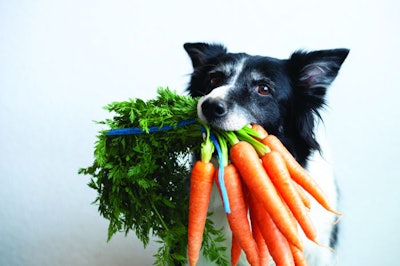
Vegetarian, vegan, religious and other lifestyles avoid carnivory, and many pet owners who follow those ethical guidelines would like to steer clear of meat in their dog’s food too. Similarly, plant-based diets appeal to pet owners who strive to reduce resource use and pollution production related to livestock. Dogs evolved a greater degree of omnivory than their wild wolf relatives, perhaps allowing pet dogs to follow plant-based diets, while maintaining their health.
Pet dogs healthy after plant-based diet
Scientists conducted an experiment on how plant-based diets affect dogs’ health. For one year, researchers at the Western University of Health Sciences, in Pomona, California, USA, observed a group of dogs after the pets transitioned from a meat-based diet to a plant-based one. The 15 dogs in the study lived in households in Los Angeles county, California.
“In this study, we confirm that clinically healthy adult dogs maintain health when fed a nutritionally complete, commercially available, plant-based diet with pea protein as a main ingredient over a twelve-month period,” the scientists wrote in the journal BioRxiv. “To our knowledge, this is the longest and most comprehensive study of K9PBN [canine plant-based nutrition] to date.
“Assessment of body condition scores, blood work, and urinalysis as well as client-reported histories confirmed that all dogs maintained physical health during the one year feeding trial. Analyses of nutritional markers in blood confirmed that levels of essential AAs, L-taurine and L-carnitine as well as lipid- and water-soluble vitamins are maintained within normal reference intervals when feeding complete K9PBN.”
The researchers noted that plant-based diets also reduce the danger of disease transmission from animals to people. These zoonotic diseases may spread from livestock to humans and vice versa.

















